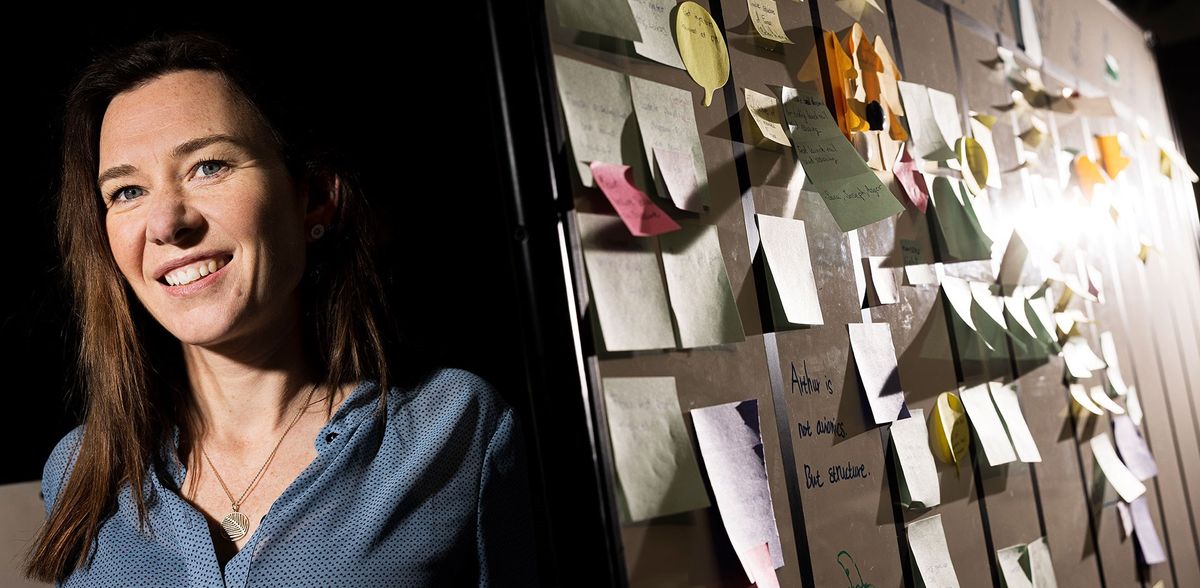How can different types of brains bolster startup success?
Advertisement
Associate Professor Carina Lomberg is on a quest to understand the cognitive, emotional, and behavioral aspects of entrepreneurs and what shapes their journey. She has found that including neurodiverse individuals in teams that start a company enhances the team’s performance.
Are there many neurodivergent entrepreneurs?
We have studied startups and discovered an overweight of people with an ADHD diagnosis that start a business compared to the neuronormative population. This makes sense, because if you look at the desired characteristics of entrepreneurs and the symptoms of ADHD—such as impulsivity and distractibility—they pretty much overlap.
But whereas in medical research, the symptoms are viewed as liabilities that require treatment, in entrepreneurship these types of traits would be celebrated and seen as strengths. Most traits are not universally positive or negative and what is functional or dysfunctional depends largely on context. So, ‘distractibility’ might be reframed as an aptitude for multitasking and ‘restlessness’ as a desire to explore uncharted terrain.
However, we also know that entrepreneurs with ADHD quite often fail, except when they manage two things in life: Completing their education and being in a stable relationship. When those factors apply, entrepreneurs with ADHD outperform those without it.
At DTU we can’t do much to help with people’s relationships, but we can help them to get an education by ensuring the right framework and support functions are in place. We must accommodate people’s differences and promote awareness of neurodiversity among staff and students.
Why are degrees and stable relationships important factors?
Data collected by Statistics Denmark showed us the magnitude of this correlation, but do not allow us to establish cause and effect. We are doing more research to try to find this out, but what we can say for now is that maybe they have found a way to fit into society’s norms or maybe they have some underlying drive to succeed. It could be one or the other, or it could be both.
What we do know is that neurodiverse entrepreneurs are more likely to succeed if they are part of a founding team where they can be valued for functions, where they perform better than others. Because then it doesn’t matter so much if they are not good at writing invoices or sending emails, as other members of the team can look after those aspects of the business.
We have in fact found that the inclusion of neurodiverse founding members enhances a team’s performance.
So being in a team is an advantage?
What we see is that entrepreneurs with ADHD who fail, quite often fail because they’re on their own. You can hustle and work a lot and have this hyperfocus, but if in the end you forget to send out invoices, you run out of cash. This is something we want to bring attention to through our research.
What are common challenges facing neurodiverse individuals?
There's still pretty high stigma. In recent years, society has slowly become more accepting of this. But there is a lot of pressure for neurodiverse individuals to try to fit into the norm, so they end up masking their needs and natural behaviour. This takes so much energy which is taken away from the actual work and reduces their ability to perform well. That’s why we see a lot of stress and burnout.
So, I would like us to get to where we recognize that some people are great at some things, but may not be good at some of the things that society might normally expect. We should see them for their abilities instead of their disabilities. Not just in entrepreneurship, but in all workplaces.
Are entrepreneurs more accepting of neurodiversity?
I think startups are probably a bit more open to neurodiversity than established workplaces because there’s this hustle mentality and ‘can-do’ mentality where there is an openness to team members saying: “I have my crunch time usually from 2am-6am where I deliver my best results. And if you’re okay with that we can work almost 24 hours a day even though we are all in the same country.”
How specifically do you work to strengthen inclusion at DTU?
I have previously done a lot of research into conflict in startups in relation to how they work together, and we see clearly that teams where things kept getting swept under the rug are the teams that at some point fall apart.
So as the head of studies of the Technology Entrepreneurship programme at DTU, I make sure we teach the students about making team contracts where they talk about their differences and explore how to use each other’s differences as strengths.
At DTU we see quite a high proportion of people with ASD (autism spectrum disorder, ed.) and there seems to be broader willingness to being more open about mental health challenges among entrepreneurs and students in general. This is a good start for increasing the acceptance and the focus on unique strengths while understanding and destigmatizing the struggles.
Other news from the department science
Most read news
More news from our other portals
Something is happening in the life science industry ...
This is what true pioneering spirit looks like: Plenty of innovative start-ups are bringing fresh ideas, lifeblood and entrepreneurial spirit to change tomorrow's world for the better. Immerse yourself in the world of these young companies and take the opportunity to get in touch with the founders.
























































